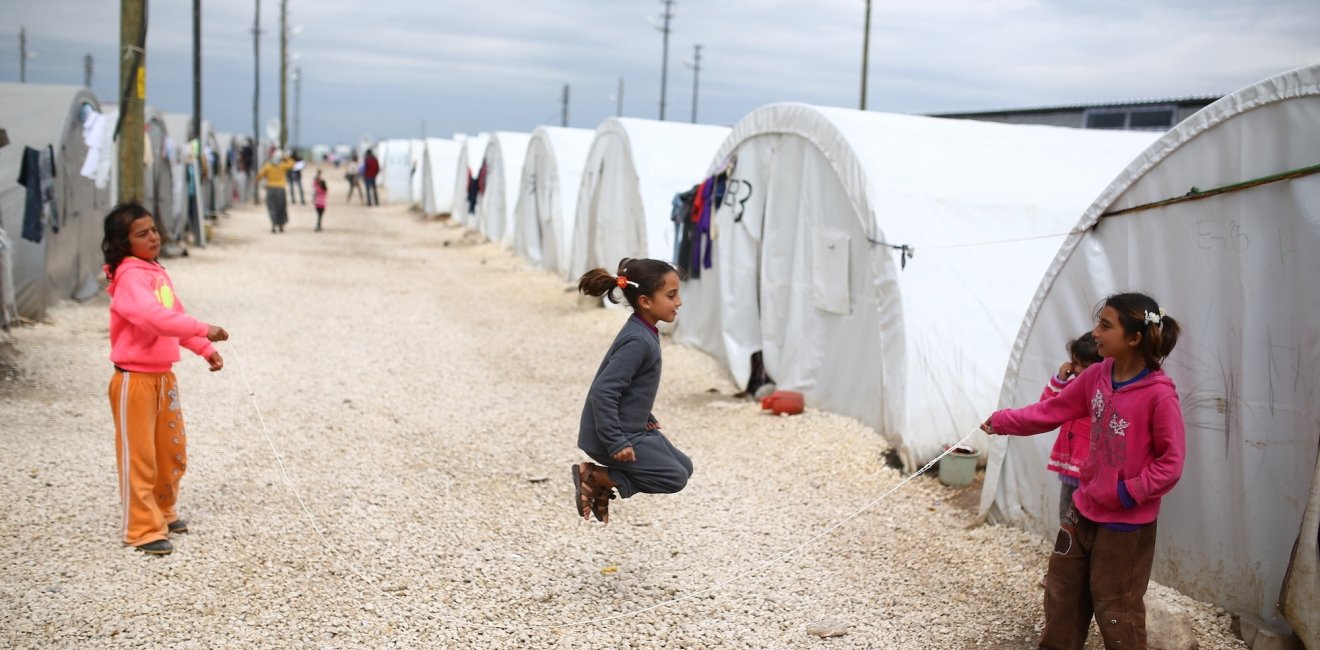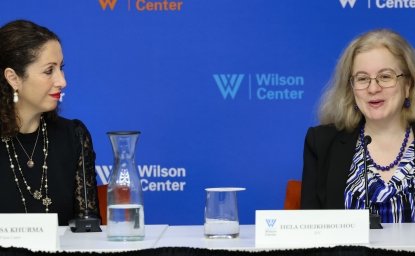In the heart of Jordan’s Zaatari Refugee Camp, Souad, a 20-year-old expectant mother, eagerly awaits the arrival of her baby. But amid the anticipation, Souad carries a heavy burden of fear that her child’s life will be fraught with hardships. “Raising a child in the camp is difficult. There’s limited access to essential resources such as clothing and baby milk formula,” she said.
Souad’s mixed emotions reflect the struggles of thousands of Syrian mothers in Zaatari Camp, located about 12 kilometers from the Syrian border and home to about 82,000 people. More than half of Zaatari’s population are children, and 1 in 4 are women of reproductive age. According to the United Nations Population Fund (UNFPA), an estimated 2,300 women and girls in Zaatari are currently pregnant.
Limited resources
But raising children in the camp is not easy. In Zaatari and nearby Azraq camp—the two largest Syrian camps in Jordan—families survive on a monthly stipend of only $32. Malnutrition and food insecurity afflict nearly 90 percent of Syrians in Jordan; the U.N. High Commissioner for Refugees (UNHCR) says “only 2 percent of refugee households can meet their essential food needs.” Despite this, the camp sees an average of 80-100 births per week, and approximately one of every ten births to Syrian refugee mothers is to a child.
“Raising children is important,” says 34-year-old Raghda, who has raised five children in Zaatari. “But this was not the life I wanted for them.”
Early marriage and early motherhood often go hand in hand, perpetuating a cycle where younger brides have more children.
The struggle for a better life often leads girls to marry young. Nearly 2 in 5 girls in Zaatari are married before their 18th birthday, almost double the global average. Zaatari has witnessed a near 12% surge in child marriages since 2019; UNFPA has already documented at least 321 underage marriages in the camp this year alone, with some brides as young as 12. Early marriage and early motherhood often go hand in hand, perpetuating a cycle where younger brides have more children.
“The population of the camp is increasing. Education is very limited. Most girls in Zaatari won’t finish their education because there are limited opportunities,” says Abeer Shraiteh, an Emergency Field Officer at UNFPA in Jordan. “It’s a challenging life in the camp, so families will look for any opportunities. Many see child marriage as one of the only options for their daughters.”
Education for Girls
26-year-old Lamees married at seventeen and has five children—all are below age 10 and have never known life outside the camp. “It was a good feeling the first time I discovered I was pregnant,” Lamees says. “But after I delivered my first baby, I started to feel what it means to be responsible for raising her, protecting her from sickness and dust, and living in this atmosphere in the camp.” Because Lamees only holds a seventh-grade education, she finds it especially hard to educate her children. “I find it difficult to teach my children because I am uneducated. It’s a problem.”
Access to education remains an uphill battle for refugee girls. Globally, more than 130 million girls between the ages of 6 and 17 are out of school, and refugee girls are 2.5 times likelier to be out of school than boys. But studies show that education has a direct correlation with delaying marriage, pregnancy, and childbirth. Conversely, girls with little or no education are three times more likely to marry by 18 than those with secondary or higher education. In Jordan, nearly 90 percent of Syrian refugees are enrolled in primary school. This drops to 25-30 percent enrollment in secondary school meaning almost 70 percent of refugee children are not in school after age 13 or 14.
“In 2023, we can’t say that a girl’s right to education has been fulfilled if she doesn’t even get the chance to finish secondary school,” says Bill Van Esveld, a children’s rights researcher at Human Rights Watch. “But enrollment plummets as refugee kids should be moving from primary to secondary, and in Jordan, we found that refugee girls are hit with a variety of harms and obstacles, including child marriage.”
Mr. Van Esvel said addressing the root causes, such as poverty and labor exploitation of refugee parents, is critical to ensuring more girls stay in school. “Jordan can do more to enforce its laws that make lower secondary education compulsory for all. It should cancel policies that block kids who were out of school for three years from returning. And for real change to take off, it’s key to improve the quality of education and stop suppressing demand; lift barriers to higher education and to entering certain professions. After a dozen years of atrocities, Syria is still not safe for returnees, and education is the sine qua non for refugee girls to realize their rights.”
Some organizations in the camp, like UNFPA, have successfully implemented family planning strategies, providing short-term and long-term care for postpartum mothers. To date, there have been zero maternal deaths in Zaatari. But Ms. Shraiteh warned the current trends of increasing child marriages and birth rates in the camp should raise alarm bells. “If a girl gets married young and has children young, it means she will never think about her dreams or future,” she says.
The long-term consequences [of early marriage] are felt by entire communities as generations of girls are denied the opportunity to reach their full potential.
Substantial research and data consistently show that the toll of early marriage and motherhood extends far beyond individual girls and their families. The long-term consequences are felt by entire communities as generations of girls are denied the opportunity to reach their full potential. When a girl feels a lack of agency and limited prospects for her future, it can contribute to a sense of hopelessness and the perception that early motherhood is the only viable path.
Addressing Root Causes
Addressing early marriage and motherhood in Zaatari requires a multi-faceted approach. Access to education is essential; it equips girls with the knowledge and skills needed to make informed choices about their livelihoods and futures. Comprehensive sexual and reproductive health education in school curricula would provide girls with the information they need to make informed decisions about their health and bodies.
Improving the socioeconomic conditions of refugee families is also crucial. This requires providing parents with economic opportunities and livelihood support to ensure they can support their families without resorting to marrying off their daughters. NGOs and humanitarian organizations working in Zaatari must collaborate with local communities to challenge sociocultural norms and practices that limit girls' opportunities for education and personal development. Community dialogues and engagement with religious and community leaders can be key in shifting attitudes and creating an environment where girls' rights are respected and protected.
Ultimately, investing in the education and health of young refugee women and girls is not only a matter of individual rights but also about building stronger communities in which everyone benefits, creating ripple effects for generations to come.
The views expressed in this article are those of the author and do not express the official position of the Wilson Center.







